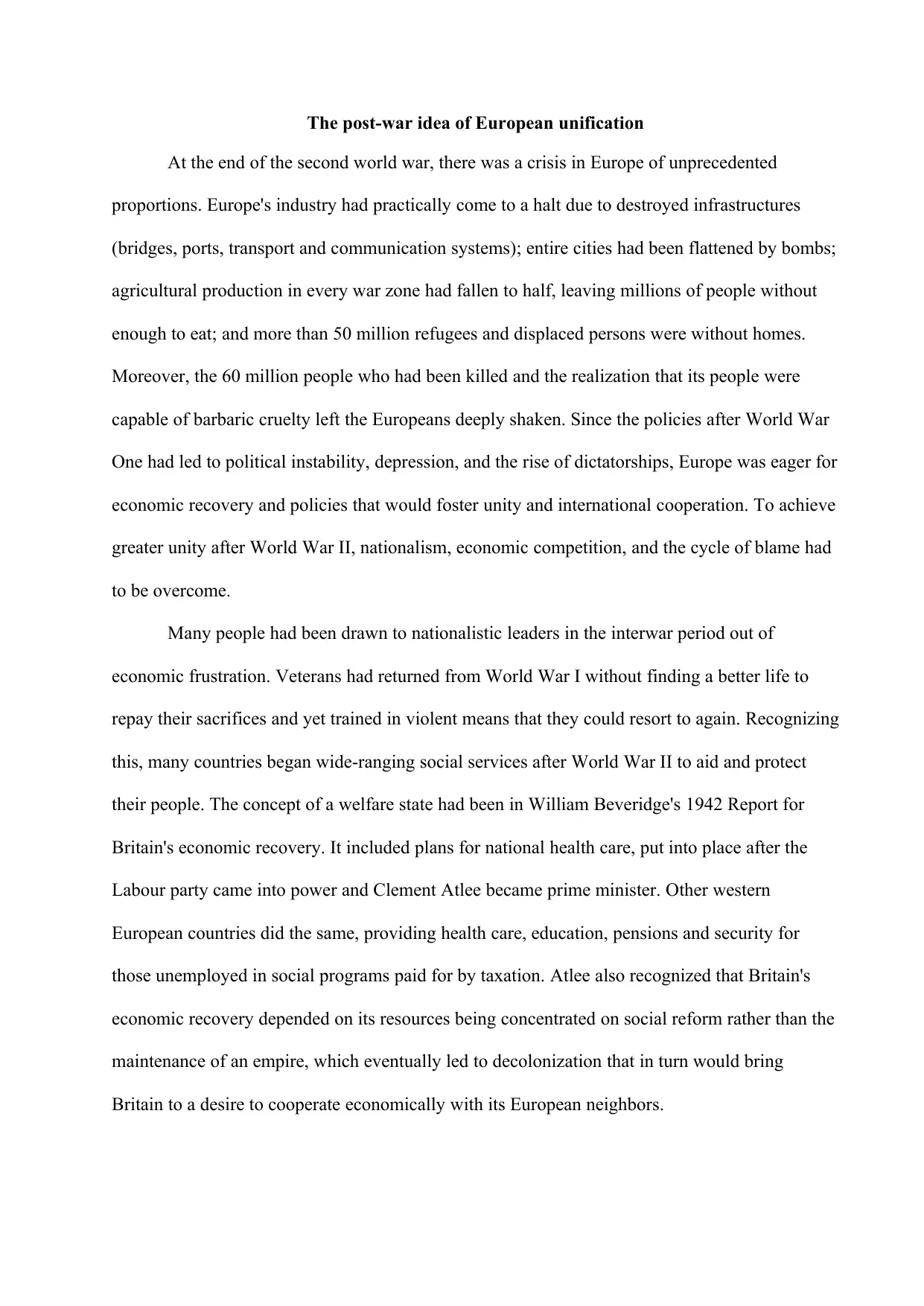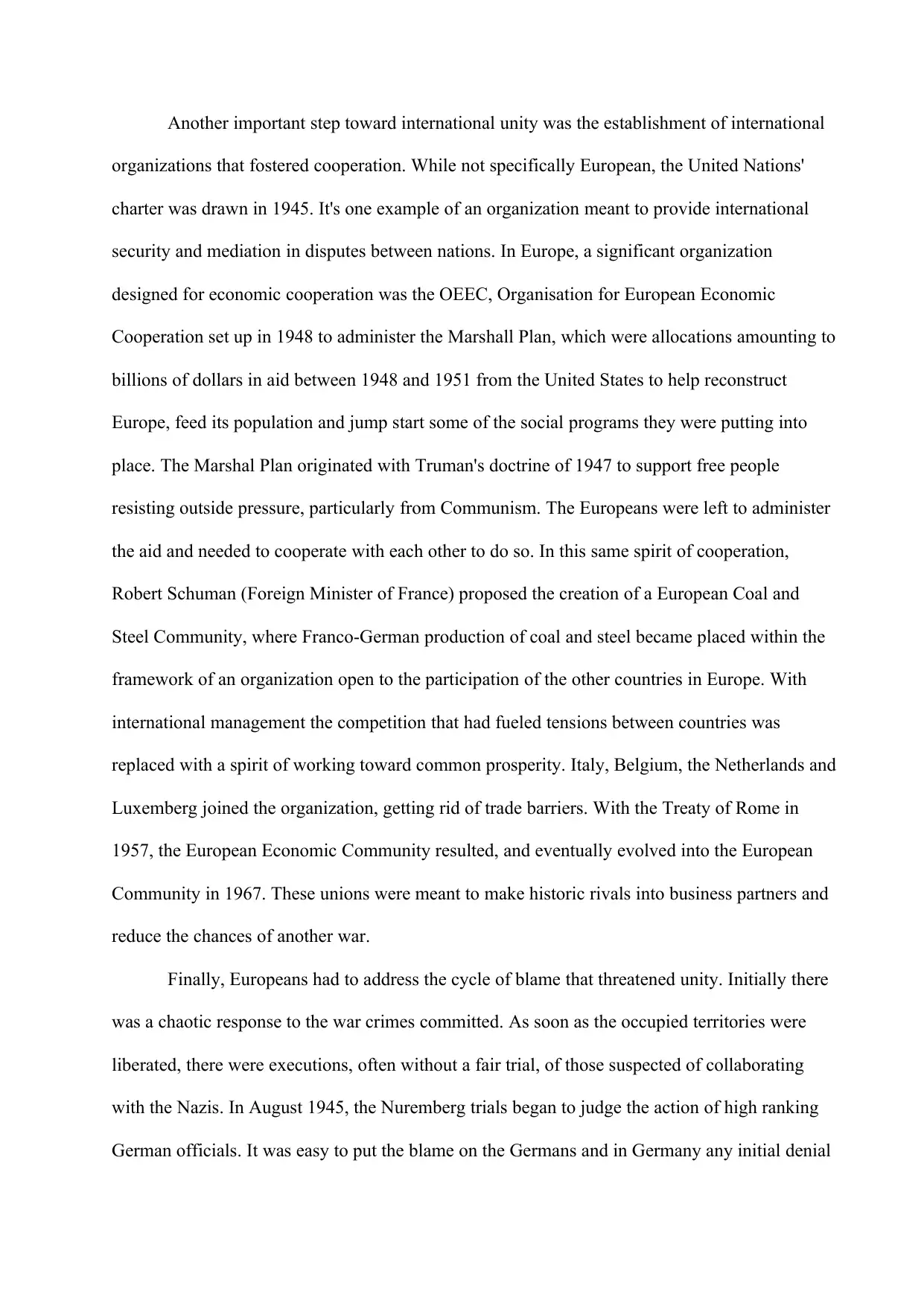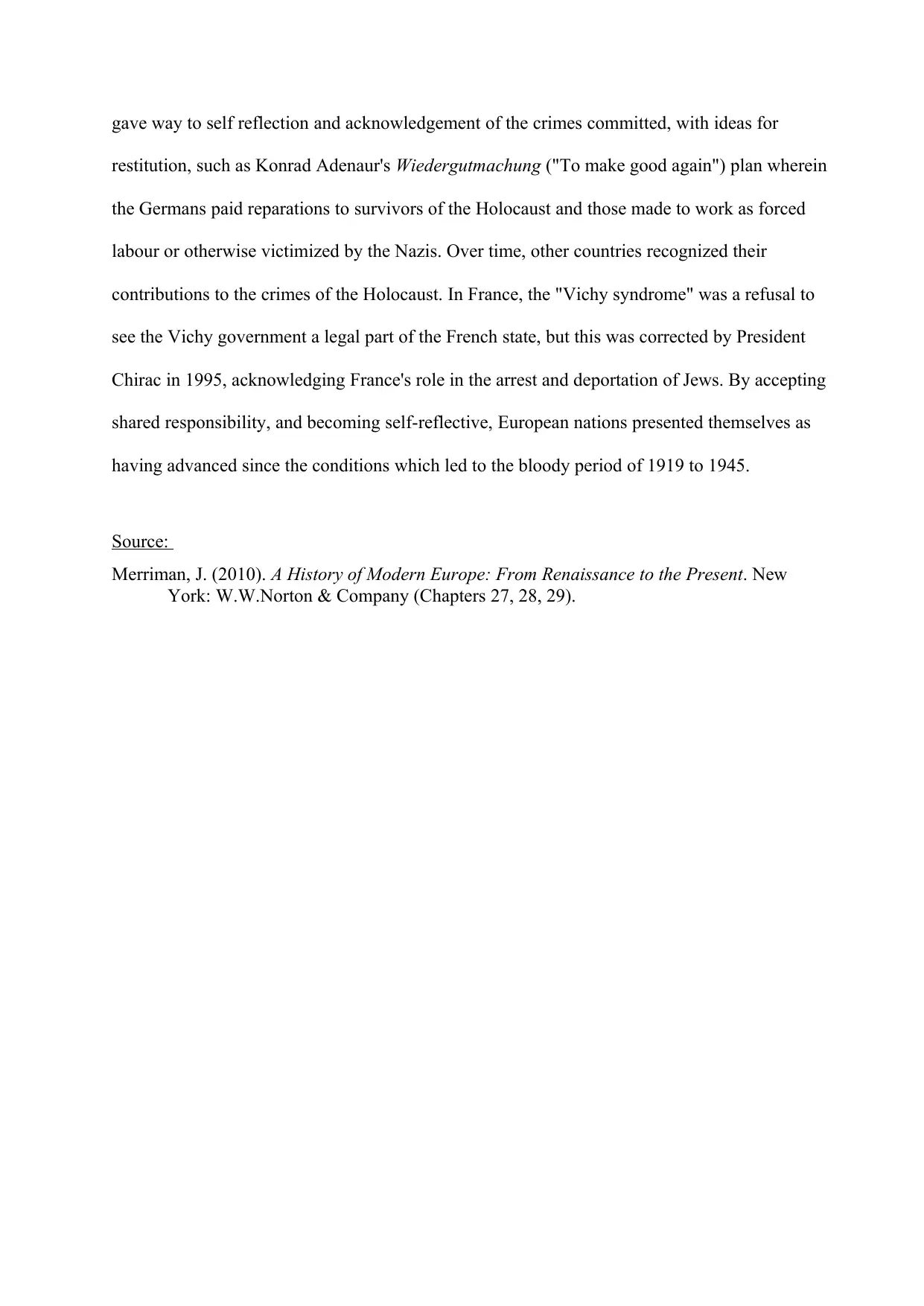European Unification: Essay on Post-WWII Recovery & Cooperation
VerifiedAdded on 2022/01/23
|3
|932
|195
Essay
AI Summary
This essay examines the unprecedented crisis Europe faced at the end of World War II, including destroyed infrastructure, widespread food shortages, and millions of refugees. It highlights the shift towards economic recovery and international cooperation to overcome nationalism, economic competition, and historical blame. The essay details the establishment of the welfare state, the role of international organizations like the United Nations and the OEEC (administering the Marshall Plan), and the creation of the European Coal and Steel Community, which eventually led to the European Economic Community and the European Community. It also explores the cycle of blame and the steps taken by European nations to address war crimes and acknowledge shared responsibility, presenting a narrative of progress from the tumultuous period of 1919 to 1945. The essay references Merriman's "A History of Modern Europe" as its primary source.

The post-war idea of European unification
At the end of the second world war, there was a crisis in Europe of unprecedented
proportions. Europe's industry had practically come to a halt due to destroyed infrastructures
(bridges, ports, transport and communication systems); entire cities had been flattened by bombs;
agricultural production in every war zone had fallen to half, leaving millions of people without
enough to eat; and more than 50 million refugees and displaced persons were without homes.
Moreover, the 60 million people who had been killed and the realization that its people were
capable of barbaric cruelty left the Europeans deeply shaken. Since the policies after World War
One had led to political instability, depression, and the rise of dictatorships, Europe was eager for
economic recovery and policies that would foster unity and international cooperation. To achieve
greater unity after World War II, nationalism, economic competition, and the cycle of blame had
to be overcome.
Many people had been drawn to nationalistic leaders in the interwar period out of
economic frustration. Veterans had returned from World War I without finding a better life to
repay their sacrifices and yet trained in violent means that they could resort to again. Recognizing
this, many countries began wide-ranging social services after World War II to aid and protect
their people. The concept of a welfare state had been in William Beveridge's 1942 Report for
Britain's economic recovery. It included plans for national health care, put into place after the
Labour party came into power and Clement Atlee became prime minister. Other western
European countries did the same, providing health care, education, pensions and security for
those unemployed in social programs paid for by taxation. Atlee also recognized that Britain's
economic recovery depended on its resources being concentrated on social reform rather than the
maintenance of an empire, which eventually led to decolonization that in turn would bring
Britain to a desire to cooperate economically with its European neighbors.
At the end of the second world war, there was a crisis in Europe of unprecedented
proportions. Europe's industry had practically come to a halt due to destroyed infrastructures
(bridges, ports, transport and communication systems); entire cities had been flattened by bombs;
agricultural production in every war zone had fallen to half, leaving millions of people without
enough to eat; and more than 50 million refugees and displaced persons were without homes.
Moreover, the 60 million people who had been killed and the realization that its people were
capable of barbaric cruelty left the Europeans deeply shaken. Since the policies after World War
One had led to political instability, depression, and the rise of dictatorships, Europe was eager for
economic recovery and policies that would foster unity and international cooperation. To achieve
greater unity after World War II, nationalism, economic competition, and the cycle of blame had
to be overcome.
Many people had been drawn to nationalistic leaders in the interwar period out of
economic frustration. Veterans had returned from World War I without finding a better life to
repay their sacrifices and yet trained in violent means that they could resort to again. Recognizing
this, many countries began wide-ranging social services after World War II to aid and protect
their people. The concept of a welfare state had been in William Beveridge's 1942 Report for
Britain's economic recovery. It included plans for national health care, put into place after the
Labour party came into power and Clement Atlee became prime minister. Other western
European countries did the same, providing health care, education, pensions and security for
those unemployed in social programs paid for by taxation. Atlee also recognized that Britain's
economic recovery depended on its resources being concentrated on social reform rather than the
maintenance of an empire, which eventually led to decolonization that in turn would bring
Britain to a desire to cooperate economically with its European neighbors.
Paraphrase This Document
Need a fresh take? Get an instant paraphrase of this document with our AI Paraphraser

Another important step toward international unity was the establishment of international
organizations that fostered cooperation. While not specifically European, the United Nations'
charter was drawn in 1945. It's one example of an organization meant to provide international
security and mediation in disputes between nations. In Europe, a significant organization
designed for economic cooperation was the OEEC, Organisation for European Economic
Cooperation set up in 1948 to administer the Marshall Plan, which were allocations amounting to
billions of dollars in aid between 1948 and 1951 from the United States to help reconstruct
Europe, feed its population and jump start some of the social programs they were putting into
place. The Marshal Plan originated with Truman's doctrine of 1947 to support free people
resisting outside pressure, particularly from Communism. The Europeans were left to administer
the aid and needed to cooperate with each other to do so. In this same spirit of cooperation,
Robert Schuman (Foreign Minister of France) proposed the creation of a European Coal and
Steel Community, where Franco-German production of coal and steel became placed within the
framework of an organization open to the participation of the other countries in Europe. With
international management the competition that had fueled tensions between countries was
replaced with a spirit of working toward common prosperity. Italy, Belgium, the Netherlands and
Luxemberg joined the organization, getting rid of trade barriers. With the Treaty of Rome in
1957, the European Economic Community resulted, and eventually evolved into the European
Community in 1967. These unions were meant to make historic rivals into business partners and
reduce the chances of another war.
Finally, Europeans had to address the cycle of blame that threatened unity. Initially there
was a chaotic response to the war crimes committed. As soon as the occupied territories were
liberated, there were executions, often without a fair trial, of those suspected of collaborating
with the Nazis. In August 1945, the Nuremberg trials began to judge the action of high ranking
German officials. It was easy to put the blame on the Germans and in Germany any initial denial
organizations that fostered cooperation. While not specifically European, the United Nations'
charter was drawn in 1945. It's one example of an organization meant to provide international
security and mediation in disputes between nations. In Europe, a significant organization
designed for economic cooperation was the OEEC, Organisation for European Economic
Cooperation set up in 1948 to administer the Marshall Plan, which were allocations amounting to
billions of dollars in aid between 1948 and 1951 from the United States to help reconstruct
Europe, feed its population and jump start some of the social programs they were putting into
place. The Marshal Plan originated with Truman's doctrine of 1947 to support free people
resisting outside pressure, particularly from Communism. The Europeans were left to administer
the aid and needed to cooperate with each other to do so. In this same spirit of cooperation,
Robert Schuman (Foreign Minister of France) proposed the creation of a European Coal and
Steel Community, where Franco-German production of coal and steel became placed within the
framework of an organization open to the participation of the other countries in Europe. With
international management the competition that had fueled tensions between countries was
replaced with a spirit of working toward common prosperity. Italy, Belgium, the Netherlands and
Luxemberg joined the organization, getting rid of trade barriers. With the Treaty of Rome in
1957, the European Economic Community resulted, and eventually evolved into the European
Community in 1967. These unions were meant to make historic rivals into business partners and
reduce the chances of another war.
Finally, Europeans had to address the cycle of blame that threatened unity. Initially there
was a chaotic response to the war crimes committed. As soon as the occupied territories were
liberated, there were executions, often without a fair trial, of those suspected of collaborating
with the Nazis. In August 1945, the Nuremberg trials began to judge the action of high ranking
German officials. It was easy to put the blame on the Germans and in Germany any initial denial

gave way to self reflection and acknowledgement of the crimes committed, with ideas for
restitution, such as Konrad Adenaur's Wiedergutmachung ("To make good again") plan wherein
the Germans paid reparations to survivors of the Holocaust and those made to work as forced
labour or otherwise victimized by the Nazis. Over time, other countries recognized their
contributions to the crimes of the Holocaust. In France, the "Vichy syndrome" was a refusal to
see the Vichy government a legal part of the French state, but this was corrected by President
Chirac in 1995, acknowledging France's role in the arrest and deportation of Jews. By accepting
shared responsibility, and becoming self-reflective, European nations presented themselves as
having advanced since the conditions which led to the bloody period of 1919 to 1945.
Source:
Merriman, J. (2010). A History of Modern Europe: From Renaissance to the Present. New
York: W.W.Norton & Company (Chapters 27, 28, 29).
restitution, such as Konrad Adenaur's Wiedergutmachung ("To make good again") plan wherein
the Germans paid reparations to survivors of the Holocaust and those made to work as forced
labour or otherwise victimized by the Nazis. Over time, other countries recognized their
contributions to the crimes of the Holocaust. In France, the "Vichy syndrome" was a refusal to
see the Vichy government a legal part of the French state, but this was corrected by President
Chirac in 1995, acknowledging France's role in the arrest and deportation of Jews. By accepting
shared responsibility, and becoming self-reflective, European nations presented themselves as
having advanced since the conditions which led to the bloody period of 1919 to 1945.
Source:
Merriman, J. (2010). A History of Modern Europe: From Renaissance to the Present. New
York: W.W.Norton & Company (Chapters 27, 28, 29).
⊘ This is a preview!⊘
Do you want full access?
Subscribe today to unlock all pages.

Trusted by 1+ million students worldwide
1 out of 3
Related Documents
Your All-in-One AI-Powered Toolkit for Academic Success.
+13062052269
info@desklib.com
Available 24*7 on WhatsApp / Email
![[object Object]](/_next/static/media/star-bottom.7253800d.svg)
Unlock your academic potential
Copyright © 2020–2025 A2Z Services. All Rights Reserved. Developed and managed by ZUCOL.




